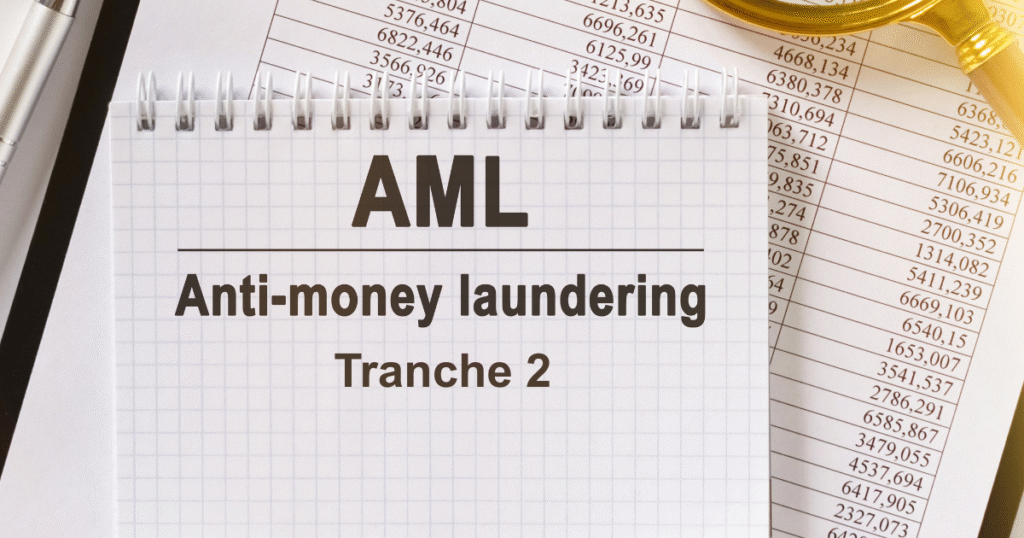Introduction
Australia’s anti-money laundering and counter-terrorism financing (AML/CTF) regime is undergoing a significant expansion with the introduction of the Tranche 2 reforms. Effective from 1 July 2026, these changes will extend compliance obligations to accountants providing certain high-risk activities, aligning Australia with international standards set by the Financial Action Task Force (FATF) and strengthening the nation’s defences against financial crime.
For accounting firms, the critical challenge lies in understanding which professional services trigger these new responsibilities. The reform is based on the nature of the work performed, meaning the distinction between a covered “designated service” and an exempt activity is crucial for determining a firm’s compliance obligation. This guide provides clarity on which accounting services are captured by the Tranche 2 reforms and which are not, helping firms to accurately scope their obligations and prepare for the changes ahead.
Services Covered by Tranche 2 Compliance Obligations
Trust & Company Creation & Management
Under the Tranche 2 reform, services involving the creation and administration of legal entities are a primary focus for compliance obligations. These activities are considered designated services because they can be used to create complex structures that obscure beneficial ownership and hide illicit funds.
If your accounting firm provides professional services that establish or manage these entities, you will be subject to the new AML/CTF rules. The following services are captured by the Tranche 2 amendment:
| Designated Service | Description |
|---|---|
| Company and Partnership Formation | Assisting clients with the creation of companies, partnerships, or other legal persons, such as by lodging incorporation documents with ASIC or helping to plan a new business structure. |
| Trust Establishment and Management | Preparing, executing, or managing legal arrangements like discretionary, unit, or hybrid trusts on behalf of a client. This also extends to setting up a Self-Managed Superannuation Fund (SMSF). |
| Organising Contributions | Facilitating the pooling of funds for a corporate purpose, such as arranging for multiple investors to contribute capital to establish a new company or facilitating a capital raise. |
| Buying and Selling Business Entities | Being instrumentally involved in the transaction of a business, such as facilitating the sale or purchase of a client’s company or managing the acquisition process. |
Managing Client Funds & Financial Transactions
Any professional service where an accountant directly handles or manages client money, assets, or significant transactions will fall under the new compliance obligation. The Tranche 2 reforms target activities where an accountant acts as a gateway to the financial system, with direct control over a client’s financial resources.
This goes beyond an advisory role and involves the actual execution of financial activities. These designated services include:
- Managing Client Assets: This covers holding or managing a client’s money, securities, share portfolios, or other assets. An example is operating a client’s bank account under a power of attorney or similar authority.
- Operating Client Accounts: The obligation is triggered if you manage or operate a client’s bank, savings, or securities accounts, including acting as a signatory or conducting transactions on their behalf.
- Handling Transactions: You will have a compliance obligation if you are involved in:
- Making or arranging payments on behalf of clients
- Facilitating high-value transactions like the purchase or sale of real estate or business entities
- Holding funds in a trust account for a specific transaction, such as an acquisition or property settlement
Acting in a Nominee or Fiduciary Capacity
A key area of risk identified by the FATF and addressed by the Tranche 2 reform is the use of nominee services to conceal the true ownership of assets. When an accountant acts in a fiduciary or nominee capacity for reporting entities, this is considered a designated service requiring full customer due diligence.
This is particularly important because such roles can be exploited to create a layer of anonymity for criminal purposes. The compliance obligation applies if you provide the following professional services:
| Designated Service | Description |
|---|---|
| Acting as a Nominee Director or Secretary | Serving as a director or secretary for a client’s company, or arranging for another person to act in that capacity. |
| Acting as a Nominee Shareholder | Holding shares on behalf of a client to obscure the ultimate beneficial owner of the company. |
| Serving as a Trustee | Acting as, or arranging for another person to act as, a trustee of an express trust or a similar legal arrangement. |
| Acting as a Partner | Taking on the role of a partner in a partnership on behalf of a client |
Providing a Registered Office or Virtual Asset Service
The Tranche 2 reforms also capture specific services that can provide a veneer of legitimacy or facilitate anonymous transactions. Offering a registered business address or engaging in virtual asset services are designated services that trigger reporting obligations to the Australian Transaction Reports and Analysis Centre (AUSTRAC).
These activities are considered high-risk because they can be used to create shell companies or move funds outside traditional financial systems. Your firm will have a compliance obligation if it provides:
- A Registered Address: This includes providing a registered office, business address, or correspondence address for a client’s company, partnership, or other legal entity, particularly when it is not their genuine place of operations.
- Virtual Asset Services: From 31 March 2026, certain services related to virtual assets will be covered. This includes:
- Exchanging virtual assets for fiat currency (or vice versa)
- Managing cryptocurrency wallets on behalf of a client
Get Your Free Initial Consultation
Request a Free Consultation with one of our experienced AML Lawyers today.
Services Not Covered by the Tranche 2 Reform
Routine Accounting & Bookkeeping Tasks
The Tranche 2 reform is not intended to regulate all accounting activities. Many traditional services are considered lower-risk and remain exempt from the new AML/CTF obligations.
These tasks are generally excluded because they involve recording historical transactions rather than creating, managing, or transferring assets on behalf of a client. Services that are typically not considered a “designated service” include:
| Exempt Service | Description |
|---|---|
| Basic Bookkeeping | Routine functions such as recording financial transactions, day-to-day data entry, maintaining general ledgers, and performing bank reconciliations. |
| Payroll Processing | The administrative task of processing payroll for a client’s employees, which is considered a routine operational function. |
| Financial Statement Preparation | The standalone service of compiling and preparing financial reports like balance sheets and income statements. |
Standard Tax Preparation & Auditing Services
The preparation of standard tax returns and the performance of audits are mainly not designated services under the Tranche 2 framework. These activities focus on compliance and reporting obligations based on past events rather than facilitating high-risk transactions. As such, an accountant providing these services will likely not have a compliance obligation under the new rules.
Excluded services in this category typically include:
- Preparing and lodging Income Tax Returns for individuals, companies, and trusts.
- Preparing and lodging Business Activity Statements (BAS) and Goods and Services Tax (GST) returns.
- Conducting statutory financial audits and other assurance engagements.
It is important to note a crucial exception. If an otherwise exempt service, such as tax advice or an audit, is provided in connection with a complex or high-risk arrangement, it may become a designated service. For instance, tax advice related to complex cross-border structures could trigger the full scope of AML/CTF obligations.
Purely Advisory & Internal Functions
Providing general advice without the authority to execute transactions is not a designated service. The key distinction is the function performed; if an accountant only offers advice and does not implement the transaction, the service is likely exempt from the Tranche 2 reform. This includes providing management consulting or general business advice.
Furthermore, services performed for internal purposes are not captured by the new compliance obligation. This applies to:
- In-house services: Accounting functions performed by a centralised finance department for its own corporate group are excluded.
- Individual finances: An accountant managing their own personal finances is not providing a professional service to a customer and is therefore not covered.
Get Your Free Initial Consultation
Request a Free Consultation with one of our experienced AML Lawyers today.
Conclusion
The Tranche 2 reform introduces a critical distinction for the accounting profession, separating high-risk “gatekeeper” functions from routine compliance tasks. The new anti-money laundering and counter-terrorism financing obligations specifically target any designated service involving the creation of trusts or companies, the management of client assets, or acting in a fiduciary capacity. In contrast, traditional services such as basic bookkeeping, preparing standard tax returns, and auditing generally remain exempt, provided they are not connected to a broader, high-risk transaction.
It is essential for every accounting firm to conduct a thorough risk assessment of its service offerings to determine its specific compliance obligations. If even one designated service is provided, the firm must prepare to meet the full scope of the Tranche 2 reforms before the 1 July 2026 deadline. If you require assistance in navigating these complex changes or developing a robust AML/CTF program to ensure you are compliant, contact our expert team for professional guidance on AML compliance for accountants.
Frequently Asked Questions (FAQ)
The primary principle determining if a professional service is covered is its function as a “gatekeeper” to the financial system. The Tranche 2 reform focuses on the nature of the service provided, not the professional title. If a service allows an accountant to create, manage, or transfer assets on behalf of a client, it is considered a high-risk “designated service” and is captured by the new compliance obligation.
Yes, if your accounting firm provides even a single “designated service” to a client, the AML/CTF obligations will likely apply. This means you will be required to implement a full AML/CTF Program to manage the risks associated with that client relationship and any related services.
General tax advice and the preparation of standard tax returns are typically not covered by the Tranche 2 reform. However, this service becomes a designated service if it is provided in connection with high-risk activities, such as structuring complex financial arrangements or cross-border transactions that could be used to obscure the flow of funds.
No, operating a trust account solely to hold funds for professional fees is generally not considered a designated service. The compliance obligation is not triggered unless the account is also used for other covered activities, such as managing client assets or facilitating transactions on their behalf.
The new AML/CTF obligations for accountants providing a designated service will commence on 1 July 2026. Accounting firms affected by the Tranche 2 reforms must enrol with AUSTRAC between 31 March 2026 and 29 July 2026.
The first steps involve conducting a thorough review of all professional services your firm offers to identify any that qualify as a “designated service.” Following this, you should perform a firm-wide risk assessment of your clients and services to understand your specific money laundering and terrorism financing risks and begin developing a tailored AML/CTF compliance framework.
The compliance obligation under the Tranche 2 amendment is determined by the type of service provided, not the size of the accounting firm. However, AUSTRAC is developing “starter program kits” designed to help small and low-complexity businesses meet their compliance obligations more easily and efficiently.
If an excluded service, such as preparing financial statements, is provided as part of a broader engagement that includes a covered “designated service,” like facilitating a business sale, the entire client relationship may be captured. In such cases, your full AML/CTF obligations would extend to all services provided to that client.
Yes, providing a registered office, business address, or correspondence address for a client’s company, partnership, or other legal entity is considered a designated service under the Tranche 2 reform. This is because such services can be used to create shell companies or obscure the true location of a business’s operations.








